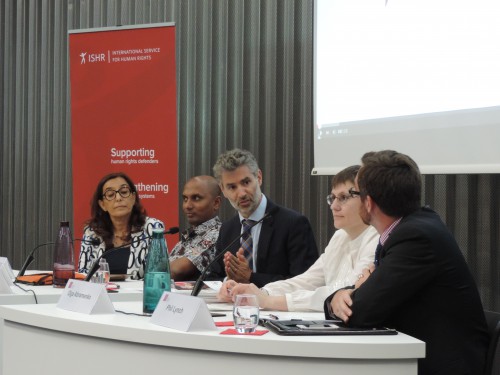14th June 2015 Geneva, Switzerland
Bursting the Bubble

It feels like we’ve hardly been away. I’m starting to suspect that someone has airbrushed April and May from the global calendar. The only clue that the months have been and gone is our hedge growing high enough to receive a letter from the estate agent ordering us to cut it by 10 centimetres and our cat’s improved strike rate at hunting the local wildlife.
During the fleeting moments when the Council isn’t in session I find that I end up honing my persuasion and negotiation skills with my family. Last week I successfully convinced my children that the dead mouse the cat had left outside was just having a very long rest after a heavy night. But then my powers failed me and I lost out to my wife on who should dispose of the rodent remains when the children weren’t looking.
Since the March session, there’s been lots of talk about how to make the Council more efficient and control its ever expanding output of resolutions, panel debates and new mechanisms. The discussion is worthwhile but if it is to lead anywhere, there will need to much broader agreement and mutual trust than exists at the moment. Regrettably a lot of damage was done last session when Egypt responded to Mexico’s noble decision to run its resolution on counter terrorism and human rights every other year, by filling the space with a much more divisive resolution on terrorism. Other states will pause for thought before leaving the field clear on the issues most important to them in future.
A more pressing challenge than efficiency is how to make the Council’s work better connected to life beyond the Geneva bubble. For all the Council’s debates on weighty global issues and despite some major achievements over the last few years it remains poorly understood by the media, unused by many national human rights organisations and largely unknown to most people in the wider world. The end result is that debates can be disconnected from real world events and states can take negative positions on issues in Geneva which are at odds with more progressive domestic policies in their own countries, and do so without attracting any public criticism or debate. It is the responsibility of all who want the Council to succeed, whether from states, civil society or the media, to put that right.
This session will hold an early debate on migration, requested by the EU in response to High Commissioner Zeid’s recent call for the Council to take up the issue. Among the other major topics that are set to come up the UK, the US, Paraguay and Albania will run a resolution on South Sudan to create a much needed monitoring mandate. This is overdue given the appalling human rights violations which have occurred in recent times and the deteriorating situation in the country. The Commissions of Inquiry on Gaza and Eritrea will both report back in the next two weeks and how the Council responds will be the subject of much heated discussion. And it looks as though we’re in for a rerun of last year’s difficult exchange on the ‘protection of the family’.
On the opening day the Council will hear from UK Minister Baroness Anelay whose attendance coincides with the 800th Anniversary of the Magna Carta. The Magna Carta’s proclamations against the arbitrary exercise of power were the foundation for the rule of law in England. Some of its clauses continue to be in force and its principles have an enduring relevance for all those seeking to uphold human rights today. At a panel event here last week, two inspiring human rights defenders described the challenges in many states where the rule of law is absent or where the law is used to persecute human rights activists. Ruki Fernando, who himself was arrested in Sri Lanka during last March’s Council session, described the erosion of the rule of law under former President Rajapaksa and the widespread violations which resulted. And Olga Abramenko, from ADC Memorial, described how Russian human rights organisations have been severely restricted by legislation which labels those who receive funding from outside Russia as “Foreign Agents” and a further new law to punish those working with “undesirable organisations”.

This will be the first session for the new UK Ambassador, Julian Braithwaite, who joins us after serving in Brussels, the Balkans and elsewhere. Karen Pierce has taken over as our Ambassador to Afghanistan and where she will face human rights challenges at the sharp end.
I wish you all a good session. It’s not going to be easy, but I’ll be happy to get through it without too many more expired rodents.

Another excellent blog Bob. Very insightful. Good luck with the session. Hope there’s a strong outcome on South Sudan.